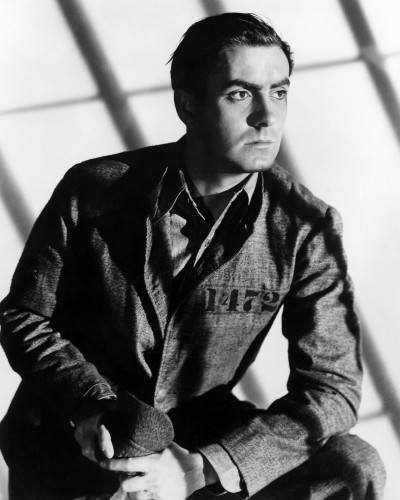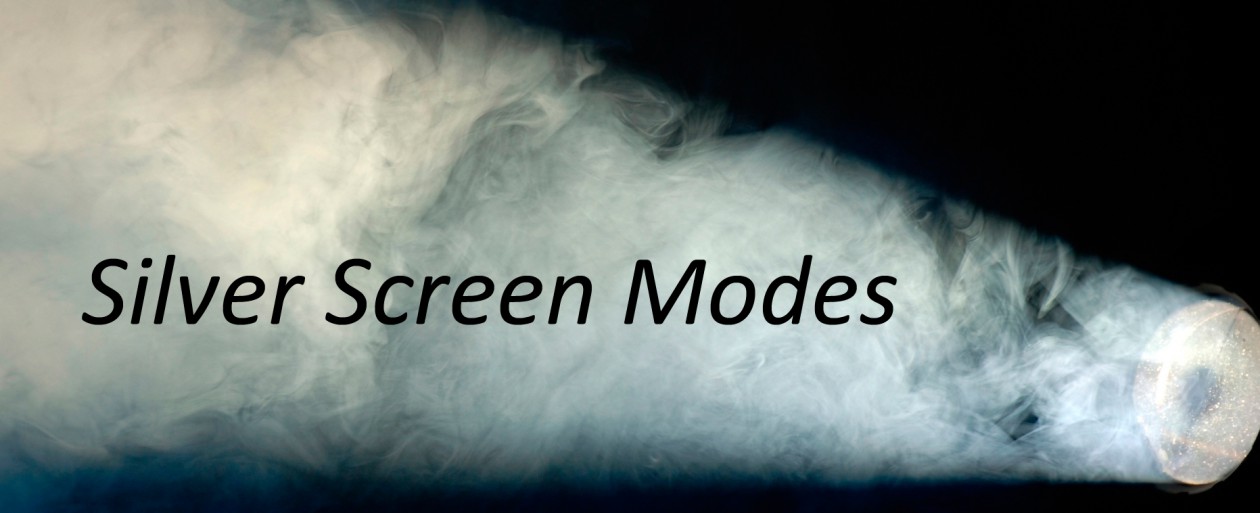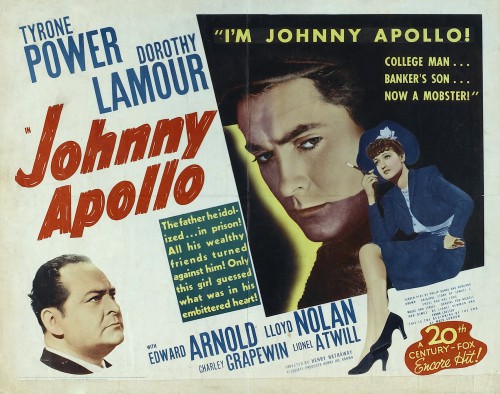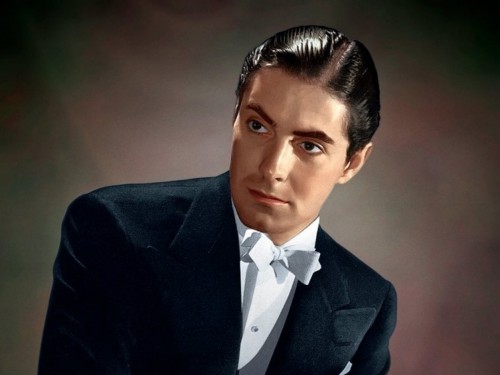Johnny Apollo: this was the title that started all the other Johnny-somethings, and for Tyrone Power, the film he needed to break away from the other pretty-boy roles he played. The film itself and its poster seemed to recapitulate the same path: pretty-boy college man ( this during the Depression); rich banker’s son; but now turning into a mobster? Was this a hit or a miss for Power? The contemporary reviews were mixed, but a fresh look is needed. Read my take as part of the Power Mad Blogathon, Monday, May 5th for the 100th anniversary of Tyrone Power’s birth, and organized by They Don’t Make ‘Em Like They Used To and Lady Eve’s Reel Life.

Johnny Apollo was a Daryl Zanuck production at 20th Century-Fox, with Henry Hathaway directing. As a mobster-themed movie, the first actor Zanuck wanted for the role was George Raft, who he hoped to borrow from Warner Brothers. This didn’t pan out and Tyrone Power asked to make the movie, eager to take on something other than his usual playboy and swashbuckling roles. The main plot-point was based on that of a rich Wall Street banker; Robert “Pop” Cain played by Edward Arnold, being sent to prison for embezzlement (sound familiar?) and losing everything, leaving his college-kid stranded. Bob Cain Jr. , played by Tyrone Power, feels betrayed and goes looking for a job everywhere, but his name is mud, and no one will hire him.
On the same day that his father was sentenced a real mobster was also sent up; Mickey Dwyer, played by Lloyd Nolan. But when Dwyer gets out of prison after only a year, Bob figures he should visit the hood’s lawyer and try to get his father out as well. It’s there that he meets Lucky Dubarry, played by Dorothy Lamour. Lucky is Dwyer’s girlfriend. The lawyer, the former Judge Brennan and current alcoholic, is played by Charley Grapewin. Brennan tells Bob that only money can get his father a parole, implying that this would be a bribe. This sinks in fast. Bob Jr’s answer is to change his name to Johnny Apollo. He needs to turn bad and make some money, and he’ll use Lucky to get to Dwyer. He can use his brains and some of his moneyed connections to offer to Dwyer. They can partner up and the money can roll in fast. Johnny’s charms are not lost on Lucky, and he likes her too.

Lucky has fallen hard for Johnny and wants to help him out. But now with a new reformed prison administration, money isn’t enough to get Pop out, who has over time become a well-loved model prisoner. Lucky convinces “Judge” Brennan to make a deal with the D.A: Pop goes free if Dwyer gets convicted. But before this can happen Dwyer finds out and kills Brennan. Soon after, both Dwyer and Johnny Apollo go to prison.

Model prisoner Pop already knew about his wayward son Johnny Apollo and now wants nothing to do with him. Nobody else knew they were related. Johnny no longer has a way to get his father out of prison, so when Dwyer plans a prison break Johnny is in on it too. Only Lucky hears of it and tips off Pop, and Pop tries to stop his son as he and Dwyer are making their escape. In a struggle Dwyer shoots Pop and knocks out Johnny, then tries his escape before getting killed by the prison guards. After, Johnny gets the wrap for shooting Pop, and a possible trip to the electric chair faces him.

No one believes that Pop is his father, and only after a long wait for his recovery Does Pop verify the story and Johnny is exonerated. Soon both are free men, reconciled. He was Johnny, but now he’s Bob Cain once again, and reunited with Lucky.

Critics and commentators have not been kind to Tyrone Power in Johnny Apollo. Like other overly handsome and beautiful actors, he had problems being taken seriously in the full bloom of youth. For Tyrone to play the heavy in a gangster movie was more a suspension of disbelief than all but his fans were willing to provide. His performance is contrasted with that of the grantedly excellent performance of Edward Arnold as Pop and Lloyd Nolan as Mickey Dwyer, and even the top performance of Charley Grapewin (the somewhat wooden Uncle Henry in The Wizard of Oz), as Judge Emmett Brennan .
The plot of Johnny Apollo has also been criticized for its several improbable turns, especially to arrive at a such a happy ending. The problem with Johnny Apollo is it’s a film made out of its time. In 1940, before World War II and still in the Depression, the audience wanted a happy ending in their movies. If it had been made three years later it would have had the kind of bad ending and other elements that would have made it a true film-noir. At an hour and a half running time, it didn’t have the kind of slow character development that say, Breaking Bad does in showing a good man turn to crime. Tyrone Powers’ easy manner of portraying the criminal is, in my opinion, more natural to a young man of his on-screen biography than would be the case with say, Richard Widmark, or the performances by the later-day kings of noir cool Alan Ladd or Dana Andrews.
Dorothy Lamour was borrowed from Paramount Pictures, where she had become famous wearing sarongs and would star in an endless series of “Road” pictures with Bob Hope and Bing Crosby. But she started out a singer, and here she gives two great performances singing: “This is the Beginning of the End,” and “Your Kiss.” She and Tyrone Power make a good screen couple, believable as the rich kid turned bad and the bad woman turned good. She could have had a future as a femme fatale.
Henry Hathaway did a fine job of directing, getting great performances from the actors and moving the plot at a clip. To use the Breaking Bad analogy further, had this been a much longer movie (or in sequels heaven forbid) the plot improbabilities may have been taken for granted, as surly they are in the TV serial. As it is, Johnny Apollo is a three-star movie and a definite film to see in the Tyrone Power repertoire. He was hoping this would launch him on a new cycle of heavier roles. Instead his good looks would typecast him for most of his career, with few exceptions, to playing swashbucklers and adventurers. This until his youthful good looks finally escaped him, near the end of his short life, which ended at age 44 in 1958. Yet even then he died just hours after having a sword in hand, from a heart attack filming a dueling scene during the production of Soloman and Sheba.
Acting was in Tyrone Power’s blood. Who but he could argue with the success he had in Hollywood? Had he lived today, the public would indulge him changing his looks in the service of his roles, a way around his beauty. As it was, he came too close to the myth of Adonis, fought over perhaps by Greek goddesses that had fallen in love with him, with one or the other casting their spells over his career, alternating their protection with their malice. He belongs to the acting pantheon now.
Views: 625



This text was so good written and has so much love and respect here….i research facts and texts about Tyrone Power and your tect is one of the best.Congratulations
Thanks Adriana, I’m glad you enjoyed this post.
I love seeing actors play against type, and I always feel like they’re having a lot of fun doing things they don’t usually get to do. This sounds like just such a movie! I’ll have to see if I can track it down.
Thanks for your comment Hamlette. Tyrone Power jumped at the chance to do this one. I saw it on TCM, but it is rarely shown on
television.
Christian, thank you so much for participating in the blogathon. This is a wonderful addition to our celebration of Tyrone Power’s centennial birthday. It’s a film I’ve not yet had the joy of seeing, but one which has been on my “want to watch” list for quite awhile.
You know, I’m a huge Lana Turner fan, and most people think the same of her—she was so beautiful that she couldn’t possibly be a good actress. I happen to think she was terrific—even despite her stunning beauty.
I think it’s the same way for Power. People seemed to dismiss him just because he was so utterly gorgeous (for me, up there with Rock Hudson and pre-accident Montgomery Clift as the most gorgeous Hollywood man I’ve ever seen). I wish people would look at his works with an open mind.
I am a big George Raft fan too. Interesting that he was the first choice for this role.
Again, thanks for participating in the blogathon.
It was my pleasure to contribute to the blogathon Patti. I’ve read some of the posts and I have many more to go.
Again, it was a great idea.
Valiant effort on the part of the young actor to show his broad range. His dissatisfaction with the swashbuckling roles never shows in those films. A true pro.
POWER MAD: THE TYRONE POWER CENTENNIAL BLOGATHON | Silver Screen Modes on Johnny Apollo http://t.co/PM7pQ7xCYW via @EMAILiT #LoveTyronePower
RT @TheLaydeeEve: POWER MAD: THE TYRONE POWER CENTENNIAL BLOGATHON | Silver Screen Modes http://t.co/PM7pQ7xCYW via @EMAILiT
POWER MAD: THE TYRONE POWER CENTENNIAL BLOGATHON | Silver Screen Modes http://t.co/PM7pQ7xCYW via @EMAILiT
This one (which I haven’t yet seen) looks really juicy…what a great combo in the leads! This is the era in which Lamour looks her best, smoulderiing 24/7, with the king of smoulder right there with her. I really have to dig this one up…thanks for the suggestion!
Yes Clayton, check this one out – they both look hot and have great chemistry.
This is a very perceptive take on Johnny Apollo and on Tyrone Power’s career and his era, Christian. As I think you may know, since I’ve probably mentioned it in a few posts, Johnny Apollo is the first film I remember seeing him in and it was love at first sight.
Darryl Zanuck has taken a lot of heat for the brief run of the much darker Nightmare Alley when it was released in 1947. But I tend to think audiences of the 1940s could not/didn’t want to see Power as anything but essentially heroic. His performance as the unrepentant killer in Billy Wilder’s Witness for the Prosecution (1957) – a big hit – was an indicator that as he aged and times changed, audiences would accept him in a wider range of roles.
Thanks Lady Eve, He was just as lovable in this film as so many of his others. A crook with the right motivations as his fans would approve.
And you are right about the changing audience of the 1950s, had he lived longer we would have seen a completely different Tyrone Power.
Tyrone Power was born 100 years ago May 5. There’s a blogathon going on in his honor – see http://t.co/VDfDWViWbU and link to the organizers